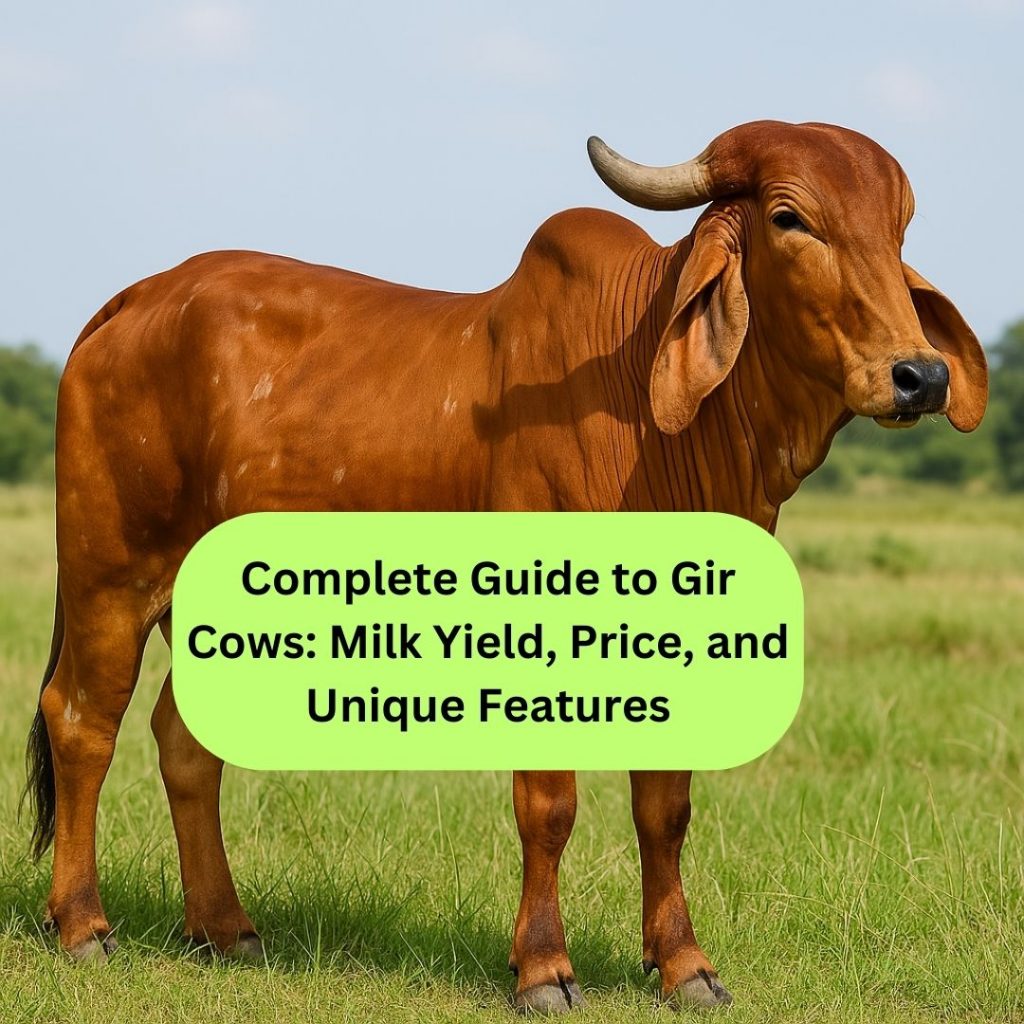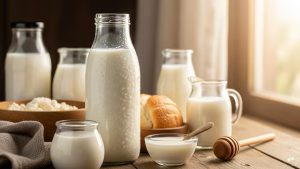What really distinguishes the Gir is the Gir’s capability to thrive in the harsh, dry, semi-arid, and arid areas, which make it an emblem of strength. Contrary to exotic breeds that frequently aren’t able to adapt to Indian climate and food conditions, the Gir cow is a pillar of strength with its inherent resistance to disease, with a high tolerance to heat, and a remarkable rate of fertility.
Beyond Indian boundaries, the importance of the Gir cow has risen exponentially. In countries such as Brazil, Venezuela, and the United States, Gir genetics are used extensively to develop high-yielding dairy breeds from tropical regions like Girolando. Girolando. Brazil now boasts some of the world’s finest Gir cow specimens—ironically tracing their ancestry back to India.
In the end, it is clear that in the end, Gir cow isn’t just a cow for milking, but an actual living legacy. The origin story of the cow reflects the profound intertwining of the environment, culture, and economics, and makes it one of the most valuable assets in the quest for organic and sustainable dairy farming.

🔍 Distinct Physical Features
It is the Gir bull is easily recognized because of its magnificent appearance and unique anatomical features that are not just visually stunning, but also serve a practical purpose that is suitable for Indian’s humid climate. These characteristics reflect the evolutionary modifications to the breed that have occurred over the years of selective and natural breeding.
| Physical Feature |
Description |
| Body Color |
Variable in shades of white, red, yellowish-red, and speckled, each cow might have a distinct pattern. |
| Forehead (Dome) |
Wide and conspicuously (“bulging”), aiding in eliminating heat A characteristic of Zebu breeds. |
| Horns |
It is a bit thick at the bottom, spirally curved upward and downwards, and backwards, creating an elegant crown-like look. |
| Ears |
Long, bent, and pendulous, and curled inward, frequently compared to the “leaf” shape; highly mobile, they aid in the regulation of temperature. |
| Eyes |
The cow is large, bold, and wrapped in black rings that give the cow the appearance of a gentle, tranquil animal. |
| Dewlap |
A prominent and fleshy tiger hanging at the back of your neck is a common feature of cattle breeds from tropical regions to increase the area of their skin to cool. |
| Skin |
Soft, loose, and flexible, which helps the cow to get rid of insects and deal with heat stress in a way. |
| Tail |
The long and dizzying whip has a nicely developed hair tuft, perfect to swat insects. |
| Udder |
A well-formed, symmetrical, and large udder with evenly spaced teats – an indicator of a good milking capacity. |
Not Just Beauty, but Biology
These physical characteristics don’t only show off—each one is a biological benefit:
- The forehead bulge is home to sinus cavities, which help maintain body temperature.
- Dewlap and long ears are naturally cooling mechanisms.
- Horns that are curved provide protection but without aggressiveness.
Together, these traits combine to make this Gir cow unique in its adaptation specifically to the Indian subcontinent and allow it to thrive and survive in areas where other breeds might be unable to.

🥛 Milk Production: Quality Meets Quantity
A Gir Cow is not only loved for its elegant appearance and calming temperament, but it is also recognized for its remarkable milk yield and its high-quality milk. What makes Gir bulls stand out is their capacity to achieve an optimal balance of the same quantity of milk and unparalleled nutritional value.
Milk Yield Overview
| Parameter |
Average Value |
| Average Daily Yield |
Between 12 and 15 liters when under good management |
| Peak Lactation Yield |
up to 20 liters/day for the top cows |
| Lactation Period |
300-320 days |
| Total Milk per Lactation |
Between 2,000 and 3,000 liters |
These figures can differ according to factors such as housing, feeding, genetics, and general maintenance. If you breed correctly and eat right, some top-line Gir cows have produced more than 5,000 liters during the lactation—an amount that is in the same league as the number of exotic breeds.
A2 Milk – Nature’s Superfood
One of the main motives for the Gir cow’s increasing popularity is because of the A2 type of milk produced by it produces. In contrast to regular milk, which contains beta-casein A1, the milk of the Gir cow is made up of just A2 beta-casein, that is:
-
Easy to take in
-
More likely to cause the symptoms of lactose intolerance.
-
Free of BCM-7 (a peptide that is linked to heart and allergies)
-
Perfect for seniors, children, and those who are concerned about their health
💡 Nutritional Profile of Gir Cow Milk
| Nutrient |
Content (Approx.) |
| Fat |
4.5% to 5.5% |
| Protein |
3.2% to 4% |
| Lactose |
4.5% to 5% |
| Calcium |
High |
| Vitamins |
Rich in A, D, and B-complex |
| Omega-3 Fatty Acids |
Present |
Gir’s cow’s milk is frequently utilized for Ayurvedic formulations and infant formulas, and premium dairy products such as A2 curd, ghee, paneer, and the powder of milk.
💰 A2 Milk = Premium Profits
Due to the increasing demand and its health advantages, A2 milk from Gir cows is sold at between 2 and 3 times the cost that regular milk is sold in the urban as well as international markets. Many dairy entrepreneurs and startups are creating premium brands from Gir dairy cows.
This is not just making the dairy farming process with Gir cattle more eco-friendly, but it also makes them extremely profitable, particularly when combined with value-added processes.
🐄 The Verdict
The Gir cow is proof that farmers don’t need to choose between quantity and quality. They can get both. With an unbeatable milk yield and a premium market value, and the highest overall health advantages, Gir cow milk is quickly becoming the top of the line in the production of organic, ethical, and sustainable dairy products.

🌿 Health & Medicinal Value of Gir Cow Milk
The milk of the Gir cow is more than just a source of nutrition—it’s a natural elixir deeply rooted in Indian tradition and now validated by modern science. Unlike milk from hybrid or exotic breeds, Gir cow milk contains A2 beta-casein, a protein structure that is remarkably similar to human milk and significantly more digestible.
🧬 What Makes Gir Cow Milk Special?
| Component |
Benefit |
| A2 Beta-Casein Protein |
Aids digestion, prevents bloating, and reduces the risk of inflammation |
| High CLA (Conjugated Linoleic Acid) |
Supports weight loss, fights cancer, boosts immunity |
| Omega-3 Fatty Acids |
Promotes heart health, brain development, and reduces cholesterol |
| Rich Antioxidants |
Fights free radicals, slows aging, and protects cells |
| Minerals (Calcium, Potassium) |
Strengthens bones, teeth, and balances body fluids |
🧘♂️ Traditional Healing Uses in Ayurveda
In Ayurveda, Gir cow milk and its by-products are revered as Satvik—pure and life-enhancing. Here are some traditional beliefs and applications:
- Raw Gir cow milk is used in Panchakarma therapies as a detoxifying agent.
- Gir cow ghee, prepared by the Vedic bilona method, is used to enhance memory and intelligence (Medhya Rasayana).
- Acts as a base for medicated milk (herbal infusions) to treat respiratory disorders, insomnia, and anxiety.
- Believed to nurture Ojas—the vital energy responsible for immunity and vitality.
🧒 Ideal for All Ages
Gir cow milk is considered safe and beneficial for all age groups, including:
- Infants (when used as a supplement with mother’s milk)
- Elderly (due to its easy digestibility and restorative properties)
- Pregnant and lactating women
- Fitness enthusiasts (as a clean source of protein and good fats)
🚫 Free from Health Hazards
Unlike milk from commercial dairy farms, Gir cow milk is often:
- Hormone-free
- Antibiotic-free
- Naturally produced with ethical practices
It is less likely to cause allergies, lactose intolerance symptoms, or gut-related issues, making it an excellent option for sensitive individuals.
🧪 Backed by Research
Recent studies suggest that A2 milk may help prevent or manage conditions like:
- Type 1 diabetes
- Heart disease
- Autism and behavioral disorders in children
- Autoimmune diseases
Many nutritionists now recommend switching to A2 milk for its long-term health benefits and low allergenic potential.
Gir cow milk isn’t just a drink—it’s a functional food, offering preventive, curative, and therapeutic value. In a world where food is increasingly processed and artificial, Gir cow milk stands out as a symbol of purity, wellness, and balance.

💰 Gir Cow Farming: A Profitable Venture
With the growing demand for the A2 type of milk, organic dairy products, and products made from animals that are ethically sourced, Gir cow farming is no longer an ancient practice. It’s a profitable agribusiness venture for modern-day smart farmers and rural entrepreneurs.
Why Choose Gir Cow Farming?
| Reason |
Advantage |
| High A2 Milk Demand |
Markets that are reputable in India and globally are willing to pay 2 to 3 times the cost. |
| Hardy and Disease-Resistant |
Low maintenance it thrives in dry, hot environments with little health risk. |
| Lower Beeding Cost |
It is well-adapted and easily adapts to the local environment, including crop residues and the grazing system. |
| Reproductive Efficiency |
Early maturation and high calving rates allow for a faster herd expansion. |
| Govt. Support & Subsidies |
Plans for indigenous breeds and the production of A2 dairy. |
Income Potential: A Sample Estimate
Let’s take a look at the more conservative estimate for the small-scale Gir cow farm that has 10 cows:
| Metric |
Approximate Value |
| Daily Milk Yield (10 cows) |
120-150 Liters |
| Selling Price (A2 Milk) |
From Rs80 to Rs120/liter (urban market) |
| Monthly Milk Revenue |
Rs2.88 + Rs5.4 lakh |
| Monthly Expenses (feed, labor) |
Rs1.2 + Rs1.8 lakh |
| Net Profit/Month |
Rs1.5 + Rs3.5 lakh |
Additional Income: The cow’s urine and dung can be utilized to create biogas, organic compost, and Panchgavya products and generate income streams.
Value-Added Products
- A2 Ghee (Rs1800-Rs3000/liter)
- Organic curd, paneer, buttermilk
- Panchagavya-based cosmetics, medicines, and other products
- Gomutra Ark and natural disinfectants
They can offer immense opportunities for export and are popular among Ayurvedic brands as well as health-conscious consumers.
Urban & Rural Models
If you’re:
- A farmer in the village, with grassy land or
- Urban entrepreneur establishing an organic dairy farm in the city
Gir cow farming can be tailored to suit your requirements and budget.
Essential Tips for Success
-
Begin by acquiring 2 to 5 purebred Gir cows from breeders who are certified.
-
Make sure you have a clean, shaded, and well-lit shelter and good drainage.
-
Offer the child a healthy diet by feeding green fodder, minerals, dry matter mix.
-
Make use of AI (Artificial Insemination) or natural breeding with superior Gir bulls.
-
Keep track of milk production and health, as well as breeding cycles, and costs.
-
Market local milk or via specific A2 milk delivery startups.
Real Stories, Real Profits
Farmers from Gujarat, Maharashtra, Tamil Nadu, and even Brazil have created viable dairy farms that are based upon Gir cows. Through social media, direct-to-consumer sales, and clever marketing, even a tiny farm can turn into an A2 brand.
The Future is Indigenous
In a world that is looking for organic, sustainable, ethical, and sustainable nutritional practices, Gir cow farming is the potential for a win-win It conserves the biodiversity of the area, helps boost rural economies, and provides healthy foods to the customers.
The investment in Gir, the farming of cows today, isn’t just about profit; it’s important.

🏡 Care and Management
To ensure the best health, the highest milk yield, and a long-lasting, productive life, Gir cows need careful care and a scientific approach to management. This is not just beneficial to profits but also helps ensure the health of the animal, while also aligning with sustainable and ethical dairy farming practices.
1. Housing and Shelter
- Offer clean, well-ventilated with dry, and clean sheds with the proper shade.
- Make sure to maintain, and that you have an east-west orientation to reduce heat stress.
- Flooring must be non-slippery and easy to clean, and sloped gently for drainage.
- Keep a separate pen for calving for pregnant cows, as well as an area for the zone of quarantine for sick or newly born animals.
| Component |
Ideal Specification |
| Space/cow |
40-50 sq. feet. covered and 80-100 sq. feet. open |
| Height of the roof |
10-12 feet with good cross-ventilation |
| Temperature tolerance |
Gir cows are tolerant of heat however, misters or fans aid in summer. |
🌿 2. Feeding and Nutrition
A healthy diet is vital to the productivity of your business. Gir cows thrive on a mixture of:
- Green fodder (e.g., Napier, Berseem, Lucerne)
- Dry fodder (wheat straw, paddy straw)
- Concentrate mix (as per lactation stage)
- Mineral mix and salt daily. regularly
Water: Provide clean drinking water 3-4 times/day—a lactating cow may need 50-80 liters/day.
Tip: Use the 1:2:1 rule of feeding 1 part concentrate, 2 parts green, 1 cup dry feed (by mass).
💉 3. Health Care and Vaccination
Prevention of disease saves money and safeguards the herd. Make sure you follow a routine vaccine and deworming schedule:
| Disease |
Vaccine Schedule |
| FMD (Foot & Mouth) |
Twice per entire year (every six months) |
| HS (Hemorrhagic Septicemia) |
Every year, before the monsoon. |
| BQ (Black Quarter) |
Annually |
| Brucellosis |
Female calves aged 4- 8 months (once) |
| Deworming |
Every 3 months |
Health checks regularly, trimming of hoofs, as well as thick and parasite prevention, are crucial.

🧬 4. Breeding and Reproduction
- Heat signs: Restlessness, frequent urination, mucus discharge.
- Utilize Artificial Insemination (AI) or natural service using a top-quality Gir bull.
- Keep the calving interval between 12 and 14 months to ensure optimal yield.
Tip: Keep track of dates for insemination and heat cycles for better management of breeding.
🍼 5. Calf Care
- Feed colostrum in the first two hours after the birth (10 percent of body weight over 24 hours).
- The navel is recommended to be disinfected using the tincture of iodine.
- Offer fresh bedding and protect your family against cold breezes.
- Introduce calf starter and water that is clean water by the second week of the calf.
✨ 6. Hygiene and Comfort
- Wash udders before and after milking.
- Learn to practice milking by hand or machine with gentle methods.
- Keep an eye on the control of your fly. Maintain fly control, make sure you have regular grooming, and provide periodic massages for your skin and stress relief.
- Create a relaxed and peaceful setting by ensuring calm handling and routine.
📋 7. Record Keeping
Keep track of:
- Milk yield
- Intake of food
- Health & vaccination
- Dates for breeding and calving
- Income and expenses
This assists in making informed decisions and identifying the best breeders for future breeding.
The proper care and management of Gir cows not just increases production but also shows your dedication to ethical, sustainable, ecological as well as sustainable practices in dairy. A healthy Gir cow isn’t just a milk producer, it’s an investment in wealth, health, and wisdom.
🌍 Global Demand and Export
A simple Gir animal, which was once loved exclusively in Indian village settings, has been transformed into an important global ambassador for the indigenous dairy heritage of India. Today, many countries around the world are taking on A2 milk and the animal breed along with the A2 dairy due to its quality of life, its adaptability, and significance to culture.
🚢 1. Gir Cows Go Global
In the last several years, Gir cows have been exported to over 30 countries in the world, with Brazil being the leader in this way in establishing a robust and genetically superior breed that is of breed.
| Country |
Gir Cow Significance |
| Brazil |
The largest Gir population outside of India and extensively used in crossbreeding with Holstein. |
| USA |
Utilized to run A2 milk farms. Highly valued for its hardiness and organic dairy farms. |
| Mexico |
The population of Gir is growing. The Gir population is valued because of its ability to adapt and the quality of its milk. |
| Australia |
Experimenting using Gir genetics to improve A2 milk, as well as climate resilience. |
| South-East Asia |
Countries such as Vietnam, Thailand, and Malaysia are evaluating Gir as a model for smallholder dairy farmers. |
Information: Brazil now exports embryos as well as frozen semen from Gir bulls across the globe, even returning to India in certain instances!
🥛 2. Rising Global Demand for A2 Milk
The world dairy market is going through an evolution with the increasing demand for milk with A2—milk that only contains the beta-casein protein from A2, which is known to be more digestible as well as less inflammatory when compared to standard A1 milk.
- Market Price Estimated to be over USD 25 billion by 2030.
- Top Markets: USA, China, Australia, New Zealand, UAE, UK
- Customer Profile: People who are conscious of their health, who are lactose sensitive, and wellness-focused families
💹 3. Export Opportunities for India
India can benefit from the huge potential of exports by:
- Live Gir Cow Exports to countries that are building tropical dairy herds
- Frozen Semen and embryos of the top Gir bulls
- Processed A2 dairy products such as cheese, ghee, and powdered milk
- Organic Panchagavya Products (Ayurveda-based) for the wellness market
Tips: Indian entrepreneurs and dairy cooperatives can join forces with A2-certified milk aggregators and construct high-end export-grade processing facilities and get FSSAI and internationally certified accreditations (e.g., USDA, EU Organic).

🌱 4. Sustainability and Ethical Appeal
The market in the world today favors the following products:
- Cruelty-free
- Organic
- Can be traced to indigenous breeds
- Sustainable source
Gir cows tick these boxes and provide a superior branding benefit for both dairy products and other value-added items.
📦 5. How to Tap Into the Export Market
This is the way Indian dairy farms and startup companies can be ready for international trade:
| Step |
Action |
| Breed Registration |
Make use of INAPH or other government-approved pedigree systems |
| Quality Assurance |
Examine for A2 gene quality, purity, and the certification of disease-free |
| Export License |
Join APEDA, Get the necessary documents and clearances |
| Join Aggregators with HTML0 |
Partner with export agencies or dairy brands that target A2 markets for milk. |
| Brand Smartly |
Highlight “Indigenous”, “Grass-fed”, “Cruelty-free”, “A2 Certified” |
🌎 Global Recognition
- FAO and ICR acknowledge Gir cows as being among the most valuable breeds of zebu worldwide.
- International breeding companies are taking an interest in Indian Gir genetics.
- The endorsements of celebrities from A2 milk (e.g., by fitness and wellness influencers and athletes) increase the visibility of.
🧭 Future Outlook
With the increasing awareness of health and the growing need for resilient farming and the quest for alternative dairy products that are ethical, Gir cow and A2 milk exports are set to experience exponential growth.
India, as the country that is home to Gir cows, has the perfect chance to take the lead in the A2 revolution across the globe.
🚀 Why Choose Gir Cow Farming Today?
In a society that is increasingly moving towards healthy choices, ethical farming, and sustainable methods of farming methods, Gir cow farming is now a wonderful opportunity, not only for business but also as an opportunity to leave a heritage with an intent.
🐄 1. Health Revolution: Rise of A2 Milk
Globally, consumers are switching towards regular A2 milk that is renowned for its:
- Easy digestibility
- The anti-inflammatory qualities of HTML0
- Lower risk of developing the symptoms of lactose intolerance
The Gir cattle are the natural source of milk A2, which makes them an ideal symbol of the movement for healthy milk..
💰 2. High Profit Potential
Gir cows yield incredible returns:
| Factor |
Benefit |
| Milk Yield |
10-20 liters/day when properly taken care of |
| Milk Selling Price |
Rs80-150/liter (A2 milk) |
| Low Maintenance Cost |
Durable and resistant to disease |
| Long Lactation Period |
Each cow becomes economically feasible |
A small herd could earn monthly incomes of up to lakhs, particularly when you brand your milk with organic or certified A2-certified.
🌱 3. Eco-Friendly and Sustainable
❤️ 4. Cultural and Spiritual Connection
The Indian culture is awash with sacred cows. In India, Gir cows are considered to be mothers and sacred representations representing:
- Prosperity
- Purity
- Spirituality
The farming of Gir cows isn’t only a business venture; it is an integral part of the culture, particularly for those who seek “Gau Sewa” and spiritual fulfillment in addition to earning.
🌍 5. Growing Global Demand
Countries such as Brazil and countries like Brazil, the USA, Australia, and the UAE are importers of Gir cattle and their breeds. The need for:
- Live Gir cows
- Frozen semen/embryos
- Milk A2 and Ghee
… It is increasing rapidly internationally and offers huge export opportunities and huge export potential for Indian farmers.
📈 6. Government Support & Incentives.
The Indian government, in different schemes, such as Rashtriya Gokul Mission, includes:
- Subsidies for the Gir purchase of cows
- The dairy industry is receiving grants to help with the construction of its infrastructure.
- Services for training and services for AI (Artificial Insemination) services
Additionally, numerous startup and tech firms are eager to cooperate with indigenous breeders of cows.
👨🌾 7. Perfect for Small & Big Farmers Alike
It doesn’t matter if you’re a first-generation agri-entrepreneur or an urban-minded person who has a dream to farm or a traditional farmer who wants to shift from agriculture towards milk; Gir cow farming can help:
- Scalability: Begin with two cows or 20
- Diversification: Create value by incorporating curd, ghee, and products derived from dung
- Resilience: Gir cows thrive on grasses native to the area and diets with low inputs
💡 Final Thought
Gir’s cow-farming isn’t an idea. It’s a revolution.
A blend of traditional and modern technology and profit, and purity, reverence, and need.
If you’re in search of a sustainable, long-term and sustainable agriculture venture, Gir cow farming is calling your name. The best moment to start is Today.
✨ Conclusion
The Gir Cow Farm is not simply a commercial venture. It’s a revitalization of the country’s cherished tradition as well as an effort to promote whole-body health and a step towards a sustainable and self-sufficient future.
With its abundant dairy, strong genetics, and the spiritual significance, the Gir cow provides an unbeatable chance to create worth that’s economically as well as ethically and environmentally sustainable..
The world is looking back to nature for the answers, India’s Gir cow stands out as a worldwide symbol of purity and wealth. If you’re an aspiring farmer, agri-entrepreneur, or just one who is a believer in wellness and traditional values, the path to change starts with one step.
We say: “If you nurture a Gir cow, she tends generations of her own. “


























